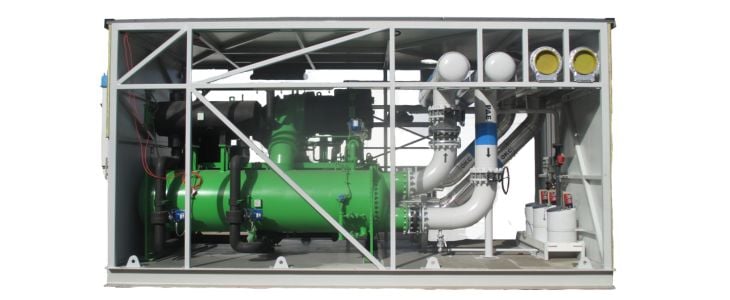Modular chillers stand at the heart of optimized battery production factories today, as precise temperature control in battery manufacturing is increasingly demanded.
This development is particularly true in the exciting arena of electric vehicle production around the world today, where technological advancements meet extreme market dynamics.
Some figures provide a context for this excitement: the International Energy Agency projected a 36% growth of electric cars annually in this decade, leading to 245 million vehicles in 2030 (over 30 times above today’s level).
However, this rapid growth comes with its own set of challenges for vehicle manufacturers and battery production factories: from choosing the right materials to generate the most efficient, reliable and lightweight battery systems.
In this context, modular chillers represent a key development in providing thermal stability during manufacturing. While battery production in itself faces several challenges related to cooling, effective thermal management during manufacturing is key for the performance, safety and lifespan of the batteries. Let’s take a look at the role of modular chillers in state-of-the-art battery production factories.
What are modular chillers and their role in battery production
Modular chillers are cooling systems designed with a scalable (modular) infrastructure, which allows users to customize cooling capacities based on their specific needs.
In order to facilitate this, these systems consist of multiple independent modules or units that work together in a flexible manner, so that they can expand or adjust the cooling capacity as requirements change.
As such, conventional chillers typically have a fixed design that doesn’t adapt to production requirements. On the contrary, a modular chiller plant means different modules can be added or removed based on production needs, providing flexibility for changing manufacturing volumes.
Designed for outstanding energy efficiency, modular chillers are also interesting for battery production factories because of their zoning capabilities. As such, they allow for independent temperature control in different sections of the manufacturing process, accommodating diverse temperature requirements during the diverse production stages.
As more and more about temperature control during the manufacturing of batteries is understood, modular chillers have been praised as an adequate response.
On the one hand, excessive heat can lead to safety hazards, especially when it comes to the lithium-ion batteries commonly used in EVs. While high temperatures can result in thermal runaway reactions, which may lead to fires or explosions, effective temperature control ensures the safety of workers in battery production factories, as well as end-users.
On the other hand, high temperatures during manufacturing can affect the performance and reliability of batteries, accelerating certain chemical reactions within them, and potentially causing degradation of the electrodes and electrolyte.
As opposed to this, modular chillers are designed to provide precise and stable temperature control, maintaining a consistent temperature level within a narrow range across the different processes of battery production.
Applications of modular chillers in battery production factories
Modular chillers can be incorporated at various stages of battery production, which showcases their adaptability to the diverse requirements of the process.
- During electrode coating and formation, they’re in charge of maintaining a stable temperature environment to ensure the proper adhesion and formation of electrode materials. Through the incorporation of variable speed compressors, they allow for adjustments based on the specific thermal needs of coating and formation stages.
- In the preparation of the electrolyte solution and the subsequent filling of battery cells, modular chillers can ensure the appropriate chemical characteristics are achieved by maintaining the desired temperature for the preparation.
- During the formation cycling stage, where charging and discharging of battery cells takes place, modular chillers provide precise temperature control, adapting for potential changes in temperature requirements through the different cycles of the formation process.
- They’re also instrumental during the compression and sealing processes, when their ability to zone different sections ensures that each step of the assembly process receives the appropriate cooling.
- Modular chillers can also be crucial during the quality control testing processes. As different testing procedures may present varying temperature requirements, this type of chiller can be critical to ensure the reliability and performance of the finished battery.

The benefits of modular chillers for battery production factories
Temperature stability
Modular chillers can provide precise temperature control which is vital to ensure the quality and consistency of battery cells throughout the different stages of battery manufacturing.
Zoning capabilities
As different stages of battery production require specific temperature conditions, modular chillers allow different sections of the manufacturing process to be controlled independently.
Energy efficiency
This type of chiller can contribute to an enhanced energy efficiency in the manufacturing process, as they are designed to provide precise temperature control with minimal energy consumption.
Fast response time
They are also known for their fast response time, as they’re able to quickly adjust temperatures to accommodate changes in the manufacturing process as needed.
Integration with automation systems
As modern battery production factories employ automation systems, modular chillers can be integrated into them, allowing for centralized monitoring and more precise control of temperature parameters.
Scalability
Conventional chillers are less adaptable to process variations and can face important challenges when manufacturing processes change or evolve. On the other hand, modular chillers allow for scalability, so that manufacturers can easily modify their production (increase production volume, introduce new technologies…) without compromising temperature control.
Modular chillers and the race to achieve sustainable battery production factories
The efforts to invest in battery production factories for electric cars represent a forward-thinking commitment to the future of sustainable transportation.
A strategic move adopted by both public and private initiatives on a global scale, the crucial role that battery technology plays in the widespread adoption of electric vehicles (EVs) must be acknowledged.
In fact, battery production factories are at the forefront of achieving strategic independence in the context of the emerging electric vehicle market, as it reduces reliance on imports.
At the same time, the focus on the battery production factories of the present and the future is also preoccupied with their environmental impact. While the global market for EVs has boomed out of the need to align with sustainability goals, production practices are being developed so that their environmental impact is minimized.
As every step of production is considered for environmental upgrades, modular chillers stand out because of their exceptional energy efficiency. As they often incorporate variable speed compressors, they’re able to adjust their cooling capacity based on the actual demand, optimizing energy consumption. In other words, periods of lower demand see the chiller operating at reduced speed, saving energy compared to traditional chillers that may run at a constant speed.
As such, modular chillers ensure only the necessary cooling capacity is deployed where and when it's needed, avoiding unnecessary energy usage.
This contributes to reduced carbon emissions associated with power generation, as well as the conservation of resources, all aligning with sustainability goals within the EVs industry.
At the same time, energy-efficient modular chillers not only benefit the environment: they also contribute to cost savings for manufacturers, as reduced energy consumption translates to lower operational costs over the long term.
At ARANER, we provide cutting-edge modular chillers for optimized thermal control at battery production factories. Through our thermal engineering expertise in developing district cooling projects, we’re able to adjust to each project’s needs and ensure maximum reliability and top-performance while meeting sustainability and cost-efficiency goals.
Get in touch with us and learn more about how we can help you.










